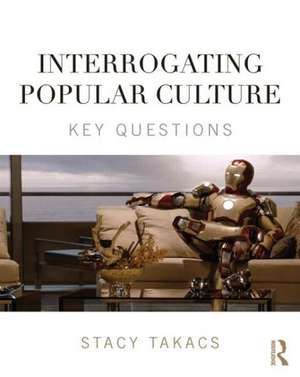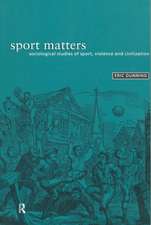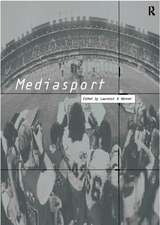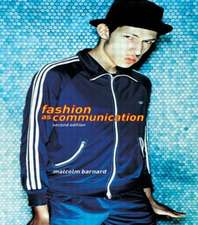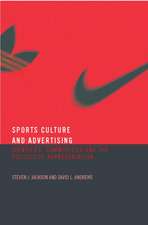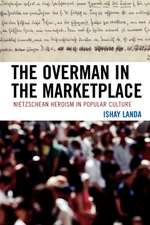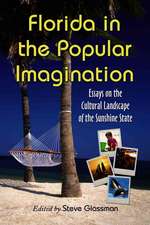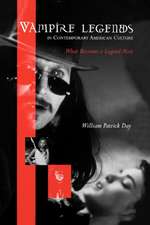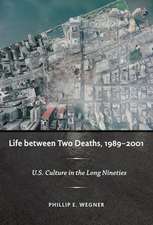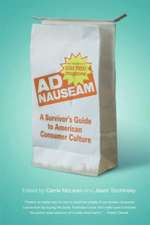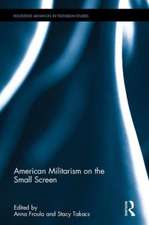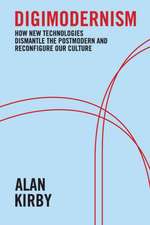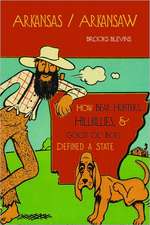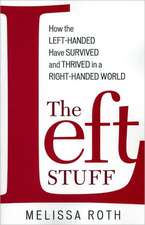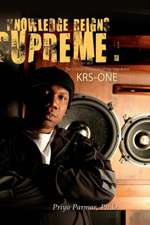Interrogating Popular Culture: Key Questions
Autor Stacy Takacsen Limba Engleză Paperback – 3 oct 2014
- Definitions: What is popular culture? How has it developed over time? What functions does it serve?
- Method: What is a proper object of study? How should we analyze and interpret popular texts and practices?
- Influence: How does popular culture relate to social power and control?
- Identity and disposition: How do we relate to popular culture? How does it move and connect us?
- Environment: How does popular culture shape the ways we think, feel and act in the world?
Preț: 332.37 lei
Preț vechi: 379.48 lei
-12% Nou
Puncte Express: 499
Preț estimativ în valută:
63.60€ • 66.58$ • 52.62£
63.60€ • 66.58$ • 52.62£
Carte tipărită la comandă
Livrare economică 05-19 aprilie
Preluare comenzi: 021 569.72.76
Specificații
ISBN-13: 9780415841191
ISBN-10: 0415841194
Pagini: 268
Ilustrații: 25 black & white halftones
Dimensiuni: 187 x 235 x 15 mm
Greutate: 0.48 kg
Ediția:New.
Editura: Taylor & Francis
Colecția Routledge
Locul publicării:Oxford, United Kingdom
ISBN-10: 0415841194
Pagini: 268
Ilustrații: 25 black & white halftones
Dimensiuni: 187 x 235 x 15 mm
Greutate: 0.48 kg
Ediția:New.
Editura: Taylor & Francis
Colecția Routledge
Locul publicării:Oxford, United Kingdom
Public țintă
Postgraduate and UndergraduateCuprins
1. What is Popular Culture? 2. Is Popular Culture Modern? 3. What is the Function of Popular Culture? 4. What is the Object of Popular Culture Study? 5. What are the Politics of Popular Culture? 6. How is Popular Culture Made and Valued? 7. How Do We Relate to Popular Culture? 8. How Does Popular Culture Move Us? 9. Is There a Global Popular Culture? 10. Does Popular Culture Make Us Smarter or Dumber? Glossary
Notă biografică
Stacy Takacs is Associate Professor and Director of American Studies at Oklahoma State University. She is also the author of Terrorism TV: Popular Entertainment in Post-9/11 America.
Recenzii
"This is the Introduction to Pop Culture text that I’ve been waiting for! A great blending of theory and practice organized around essential questions rather than genres, it offers thought-provoking interrogation of contemporary examples from across the pop culture spectrum. I look forward to using it in my intro Pop Culture class." —Dr. Tony Harkins, Director, Popular Culture Studies program, Western Kentucky University
"Stacy Takacs' new book teaches in the best way, by asking questions and encouraging readers to ask their own questions of popular culture. Interrogating Popular Culture ranges confidently far and wide in its historical and geographical scope, from Ancient Roman spectacles to The Hunger Games trilogy. Takacs' tone—lively, convincing and real—will engage and inform student readers, inviting them to become critical scholars of their own popular culture." —Will Brooker, Kingston University
"Stacy Takacs' new book teaches in the best way, by asking questions and encouraging readers to ask their own questions of popular culture. Interrogating Popular Culture ranges confidently far and wide in its historical and geographical scope, from Ancient Roman spectacles to The Hunger Games trilogy. Takacs' tone—lively, convincing and real—will engage and inform student readers, inviting them to become critical scholars of their own popular culture." —Will Brooker, Kingston University
Descriere
Interrogating Popular Culture: Key Questions offers an accessible introduction to the study of popular culture, both historical and contemporary. Beginning from the assumption that cultural systems are dynamic, contradictory, and hard to pin down, Stacy Takacs explores the field through a survey of important questions, addressing:
- Definitions: What is popular culture? How has it developed over time? What functions does it serve?
- Method: What is a proper object of study? How should we analyze and interpret popular texts and practices?
- Influence: How does popular culture relate to social power and control?
- Identity and disposition: How do we relate to popular culture? How does it move and connect us?
- Environment: How does popular culture shape the ways we think, feel and act in the world?
